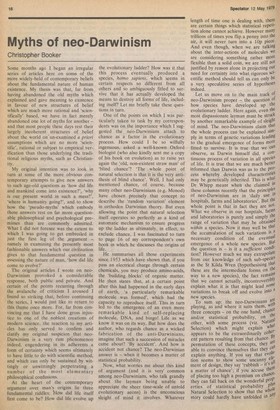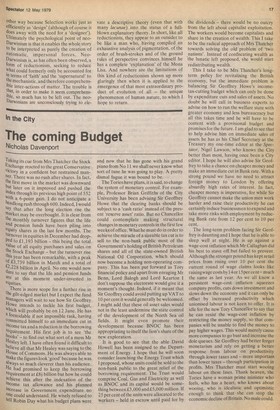Myths of neo-Darwinism
Christopher Booker
Some months ago I began an irregular series of articles here on some of the more widely-held of contemporary beliefs about the fundamental nature of human existence. My thesis was that, far from having abandoned the old myths which explained and gave meaning to existence in favour of new structures of belief which are much more rational and 'scientifically' based, we have in fact merely abandoned one lot of myths for another — and that most people these days rest their largely incoherent structures of belief about the world on'un-examined a priori assumptions which are no more 'scientific', rational or subject to empirical verification than those underlying the traditional religious myths, such as Christianity.
My original intention was to look in turn at some of the more obvious contemporary attempts to give new answers to such age-old questions as 'how did life and mankind come into existence?', 'why is our present world in such a mess?', 'where is humanity going?', and to show how the 'pseudo-myths' which embody those answers rest on far more questionable philosophical and psychological premisses than are commonly admitted. What I did not foresee was the extent to which I was going to get embroiled in just the first leg of the _argument — namely in examining the presently most fashionable answers which our civilisation gives to that fundamental question in assessing the nature of man, 'how did life come to evolve?'
The original articles I wrote on neoDarwinism provoked a considerable response, both public and private. And certain of the points recurring through the avalanche of criticism I aroused I found so striking that, before continuing the series, I would just like to return to this theme once more. For, far from convincing me that I have done gross injustice to one of the noblest creations of modern science, the reaction to my articles has only served to confirm and clarify my original suspicion that neoDarwinism is a very rum phenomenon indeed, engendering in its adherents a form of certainty which seems ultimately to have little to do with scientific method, and which can only be sustained by wittingly or unwittingly perpetrating a number of the most elementary philosophical confusions.
At the heart of the contemporary argument over man's origins liefl three fundamental riddles: 1-10w did life itself first come to be? How did life evolve up the evolutionary ladder? How was it that this process eventually produced a species, homo sapiens, which seems in certain respects so different from all others and so ambiguously fitted to survive that it has actually developed the means to destroy all forms of life, including itself? Let me briefly take these questions in turn.
One of the points on which I was particularly taken to task by my correspondents was on the importancewhich I suggested the neo-Darwinians attach to chance as a factor in the evolutionary process. How could I be so wilfully ingenuous, asked a well-known Oxford biologist (who also kindly sent me a copy of his book on evolution) as to raise yet again the :old, non-existent straw man' of 'blind chance'? 'The whole point of natural selection is that it is the very antithesis of blind chance'. Well, I had only mentioned chance, of course, because many other neo-Darwinians (e.g. Monod) have chosen precisely that concept to describe the 'random variation' element in orthodox Darwinian theory. But even allowing the point that natural selection itself operates so perfectly as a kind of automatic mechanism to ensure progress up the ladder as ultimately, in effect, to exclude chance, I was fascinated to turn to page 16 of my correspondent's own book in which he discusses the origins of life.
He summarises all those experiments since 1953 which have shown that, if you pass an electrical charge through certain chemicals, you may produce amino-acids, the 'building blocks' of organic matter. He then states that, at a certain point after this had happened in the early days of earth, 'a particularly remarkable molecule was formed', which had the capacity to reproduce itself. This in turn led to the emergence of an even more remarkable kind of self-replacing molecule, DNA, and bingo! Life as we know it was on its way. But how does the author, who regards chance as a wicked fabrication of the anti-Darwinians, imagine that such a succession of miracles came about? 'By accident'. And how is accident not chance? The neo-Darwinian answer is — when it becomes a matter of statistical probability.
Now, what worries me about this kind of argument (and it is very' common among neo-Darwinians, who talk grandly about the layman being unable to appreciate the sheer time-scale of untold evolutionary aeons) is the unconscious sleight of mind it involves. Whatever length of time one is dealing with, there are certain things which statistical repetition alone cannot achieve. However manY trillions of times you flip a penny into the air, it will never turn into a 10p piece. And even though, when we are talking about the inter-actions of molecules vie are considering something rather more flexible than a solid coin, we are still not justified by reason alone in projecting our need for certainty into what rigorous scientific method should tell us can only be a very speculative series of hypotheses indeed. Let us move on to the main track of neo-Darwinism proper — the question Of how species have developed up the evolutionary ladder. Here again, even the most dispassionate layman must be struck by another remarkable example of sleight of mind. The neo-Darwinians claim that the whole process can-be explained simply in terms of genetic variations leading to the gradual emergence of forms more fitted to survive. It is true that we can observe, as Darwin himself did, a continuous process of variation in all species of life. It is true that we are much better informed than Darwin was as to the pr°cess whereby developed characteristics may be genetically inherited. This is what Dr Whipp meant when she claimed In these columns recently that the principles of neo-Darwinism are in 'daily use in hospitals, farms and laboratories'. But the whole point is that in fact they are not' What we observe in our hospitals, fauns and laboratories is purely and simply the, range of variation that may be obtainen within a species. Now it may well be that the accumulation of such variations IS necessary condition of the event' emergence of a whole new species. Bo! the question is — is it a sufficient condition? However much we may extrapolate from our knowledge of such sub-specles as the St Kilda Wren (hypothesising that these are the intermediate forms on the way to a new species), the fact remains that we cannot actually, incontrovertiblY explain what it is that might lead sotne variations to break off and evolve into a new species. To sum up: the neo-Darwinians a,rfi playing, as and where it suits them, sot three concepts — on the one hand, chance and/or statistical probability, on the, other, with some process (viz. Nat; Selection) which might explain W113 appears to be the extraordinarily cohet" ent pattern resulting from that chance. I3Ye permutation of these concepts, they aro able to convince themselves that they ca explain anything. If you say that eycl,111, tion seems to show some uncanny e'er ment of design, they say 'rubbish — it's a a matter of chance'; if you accuse thern of placing too high a premium on chance' they can fall back on the wonderful pr.:Vs erties of statistical probability Phi,,„ Natural Selection to show that the %OW'', story could hardly have unfolded in an' Other way because Selection works just as efficiently as 'design' (although of course it does away with the need for a 'designee). Ultimately the psychological point of Darwinism is that it enables the whole story to be interpreted as purely the creation of automatic, impersonal forces. NeoDarwinism is, as has often been observed, a form of reductionism, seeking to reduce What could formerly only be accounted for in terms of 'faith' and the 'supernatural' to the mechanistic, and therefore comprehensible inter-actions of matter. The trouble is that, in order to make it seem comprehensible, so much has to be left out. The neoDarwinians are unconsciously trying to ele vate a descriptive theory (even that with many lacunae) into the status of a fullblown explanatory theory. In short, like all reductionists, they appear to an outsider to be like a man who, having compiled an exhaustive analysis of pigmentation, of the order of brush-strokes and of the ground rules of perspective convinces himself he has a complete 'explanation' of the Mona Lisa. And nowhere are the limitations of this kind of reductionism shown up more glaringly then when it is applied to the emergence of that most extraordinary product of evolution of all — the unique phenomenon of human nature, to which I hope to return.



































 Previous page
Previous page